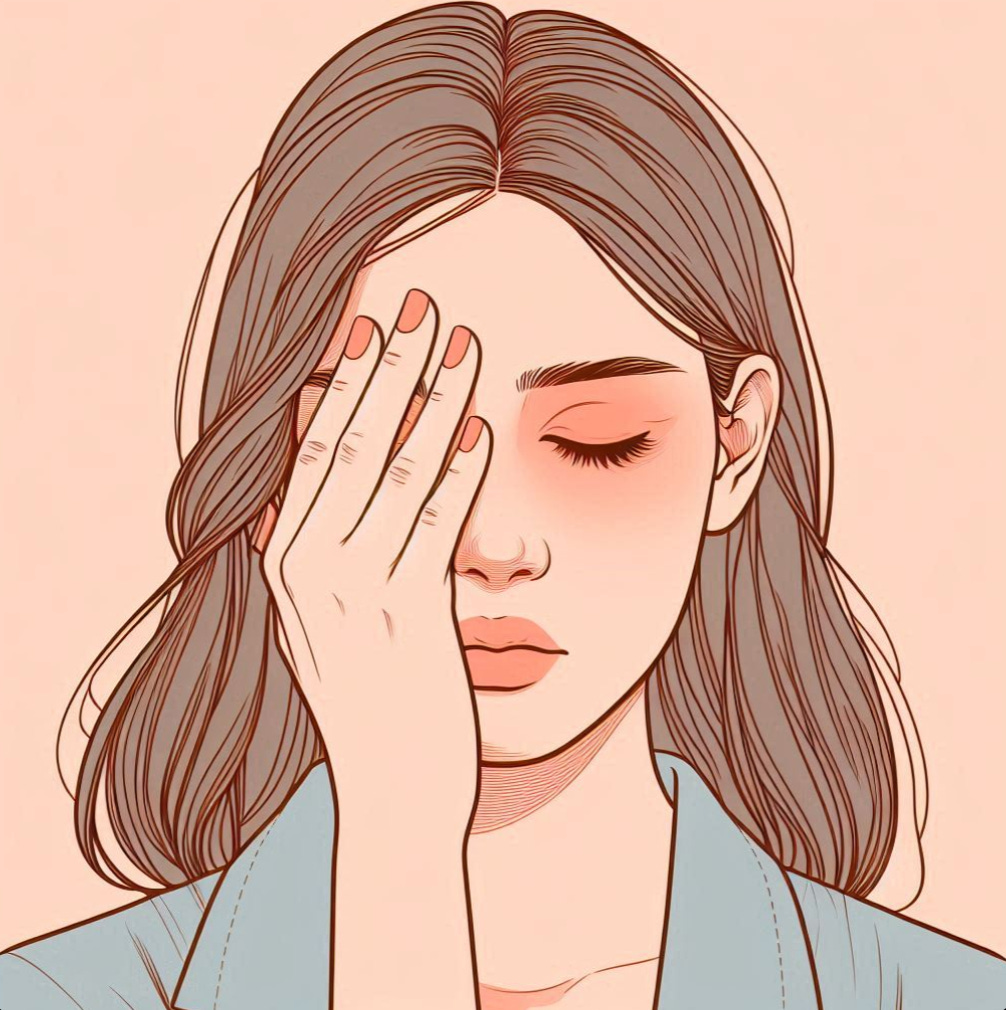Can eyes be windows to the soul...and to illness?
What is uveitis, and how can it help diagnose autoimmune diseases such as ankylosing spondylitis?
Now when you first think of inflammatory arthritis, you don’t automatically think of your eyes, well I certainty didn’t anyway. When I was first diagnosed with Ankylosing spondylitis (AS), an inflammatory arthritis of the spine, my Rheumatologist (VERY briefly) mentioned that I may be at increased risk of getting an eye condition called uveitis.
I had not heard of this particular condition before, so when I got home I started to do my own research. I saw on the Specsavers website a little bit about it, and it mentioned that if I had any further queries I could call my local branch for more information. Now I wouldn’t usually do this (being a massive introvert that hates talking on phones, am I weird?), but I called them up (I’m so brave), and I’m so glad I did because they were super helpful. They made an appointment for me to come in the next day, they checked over my eyes and answered all my questions about what uveitis is, what symptoms to look out for, what I needed to do if I thought I had the symptoms in the future etc. They even said that if I needed to, I could come into my local branch and get treated straight away without having to go through my GP (obviously check with your local branch first before doing this, as it may be different where you are). I left feeling really reassured and clued up, which helped to reduced my anxiety massively. But before I get ahead of myself…
What is uveitis?
The NHS website describes uveitis, also known as iritis, as a rare condition that causes inflammation inside part of your eye. There are a few different types of uveitis which affect different parts of the eye, but the most common one affects the front part of the eye between the cornea and lens, in/around the iris (anterior uveitis). Diagram below if you need to refresh yourself with the eye anatomy.
What are the symptoms:
Red or watery eyes
Eye pain
Reduced or blurred vision
Sensitivity to light (photophobia)
Flashes or floaters (Flashes of light in the corner of your eyes, or dark spots)
Usually affects one eye, but can affect both
Symptoms can appear quickly (hours), or over a few days or can even come gradually over weeks/months
Other conditions that cause similar symptoms:
- Glaucoma
- Growth in the eye
- Injury to the eye
- A virus e.g. herpes simplex
Complications:
If not treated quickly it can cause vision problems and blindness! So it’s not one to ignore.
The NASS website says that ‘Untreated inflammation damages the lens by causing the iris to stick to it. The inflammation can also cause cataract (a clouding of the lens of your eye leading to blurred vision) and raised pressure in the eye, which can lead to glaucoma (where the nerve in the eye is damaged by the raised pressure eventually resulting in the loss of vision if left untreated)’. Sounds jolly doesn’t it…
Causes:
In a lot of cases the cause of uveitis is unknown, however there are some links between your immune system & autoimmune disease such as MS, IBD or ankylosing spondylitis (which this article focuses on). There seems to be a link between the HLA-B27 gene and an increased risk of getting uveitis. But that’s not the only gene, and not everyone with the gene gets uveitis, so there are obviously other factors involved e.g other genes or environmental links. Clearly more research still needs to be done in this area.
How common is it with AS?
The NASS website says that between 30-40% of people with AS will develop uveitis. Which I was shocked to read when I first saw that fact, that’s quite a large chunk of people!
One study I read said that ‘Uveitis is the most common, non-articular, clinical manifestation of ankylosing spondylitis’.
So that was another reason I was quite shocked, and disappointed, that my Rheumatologist didn’t spend more time on explaining what uveitis was. (You learn to live with a lot of disappointment with a chronic illness..anyhoo I digress..)
To help put it in perspective and to compare it to other autoimmune diseases:
2-3% of people with Inflammatory bowel disease also get uveitis
In patients with MS, the frequency of uveitis ranges from 0.4 to 26.9% and in patients with uveitis, the prevalence of MS is 1%-2%
Due to this strong link between uveitis and AS, in some circumstances it has been used as a way for people to get a diagnosis of AS. I have read stories from people in forums that said their recurring uveitis lead their Ophthalmologist to suggest a referral to Rheumatology, or led them to getting a HLA-B27 blood test. So screening of the eyes could be one (large) part of the puzzle to getting a diagnosis. My own Ophthalmologist at Specsavers seemed pretty clued up on AS which was surprising, but a refreshing comfort I must say! And it also goes to show the importance of clear communication between different specialties.
So how do we treat it?
The important thing is that you get seen to quickly. Call your GP, ring 111 (UK) or visit A&E, who will then refer you to an eye doctor (Ophthalmologist) usually within 24 hours.
They will then examine your eye and will usually administer steroid drops, such as dexamethasone (e.g. Maxidex) and prednisolone (e.g. Pred Forte), which will help reduce the inflammation. They may also administer ‘Dilating drops’ (drops that dilate the pupil) to help reduce the risk of the iris sticking to the lens.
Most studies that I have read also say that taking the TNF medications (biologics) help to reduce the risk of getting uveitis, or at least reduce the frequency of the attacks. Due to them being immunosuppressants, it helps to reduce the inflammation and over activity of your immune system.
The NHS website also explains other possible treatments, so it’s worth a read.
They also mention the importance of having a follow-up appointment to check that the medications are working, and no damage has been done to the eye. So if you don’t hear anything back from your Doctors, chase this up!
Summary
I know this article is quite niche for us Anky spon folk, but I hope you found it helpful. Thankfully I have not had any eye symptoms (yet), but I’m glad I did my research. I think it highlighted to me that the NHS can only take me so far on my healing journey, there is still a lot that I need to do to look after myself, if that makes sense. I had to do a lot of my own research and actively seek out specialists for more information. If I just left it all to my NHS Rheumatologist, I may not have found out about uveitis and how dangerous it could be left untreated. I think it’s so important to be an active participant in your own health and healthcare. Obviously we need to be careful reading what ‘Dr Google’ says and take it with a pinch of salt, but I’ve realised that my Nursing background, and how to read studies and research, has really come in useful. It's a good skill to learn. We need to become experts in our illness because information won’t always be handed to us in a neat little package (frustratingly).
This is also the part I think ‘non-ill’ folk don’t always appreciate; the amount of time (and energy) we have to spend on researching and trying to find answers. I am so thankful I live in the time where I have access to information via the internet, and finding online communities/forums where I can chat to others going through similar experiences. Ultimately, I have found that information & knowledge about my health is incredibly empowering.
Other resources:
The NASS website has a great document all about uveitis
The Arthritis Foundation website has some general information about eye health and various conditions
Specsavers also have general info about uveitis on their website
Here is a Youtube video describing what uveitis is in case you’re more of a visual/audio learner
How about you?
Did you know there was a link between eye health and autoimmune diseases? If you have AS, have you ever experienced uveitis? How did it feel? Did it help you to actually get a diagnosis of AS? Does anyone else worry about this symptom popping up at the most inconvenient time, like when you’re on holiday, or is that just my over anxious brain? If you are on TNF meds, did it reduce your uveitis occurrences, or did you still develop it on the meds? I would be interested to know!
Sending healing thoughts to you all. See you next week!
Lots of love & hugs,
Amanda x
P.S I would love to keep my blog free so I can keep spreading awareness of Ankylosing spondylitis (AS), and so people can access information about chronic illnesses. However, if you like my work and want to say thanks, you can buy me a ‘coffee’ with the link below (obviously no pressure, I still love ya). Thank you for your support!






Another charming thing to ponder over! My right eye is wonky with weird floaters and a moving gloopy spot; I have a detached aqueous something or other (décollement du corps aqueux) , randomly happened last October two days after my daughter’s wedding! Hope you’re ok, I’m in a flare… but should hear from my gastroenterologist today or tomorrow. And a friend recommended a gastroenterologist in Barcelona who is apparently amazing. Will contact today. Fun fun fun!!
A good friend was having eye trouble in her 30s, and she was diagnosed with uveitis and immediately referred to a rheumatologist (or maybe a GI doc), where it was discovered that she also had ulcerative colitis (which her father also had when he was alive). So strange, but she had competent professionals guiding her from the get go. She switched to an anti-inflammatory diet and essentially eliminated both problems over time.